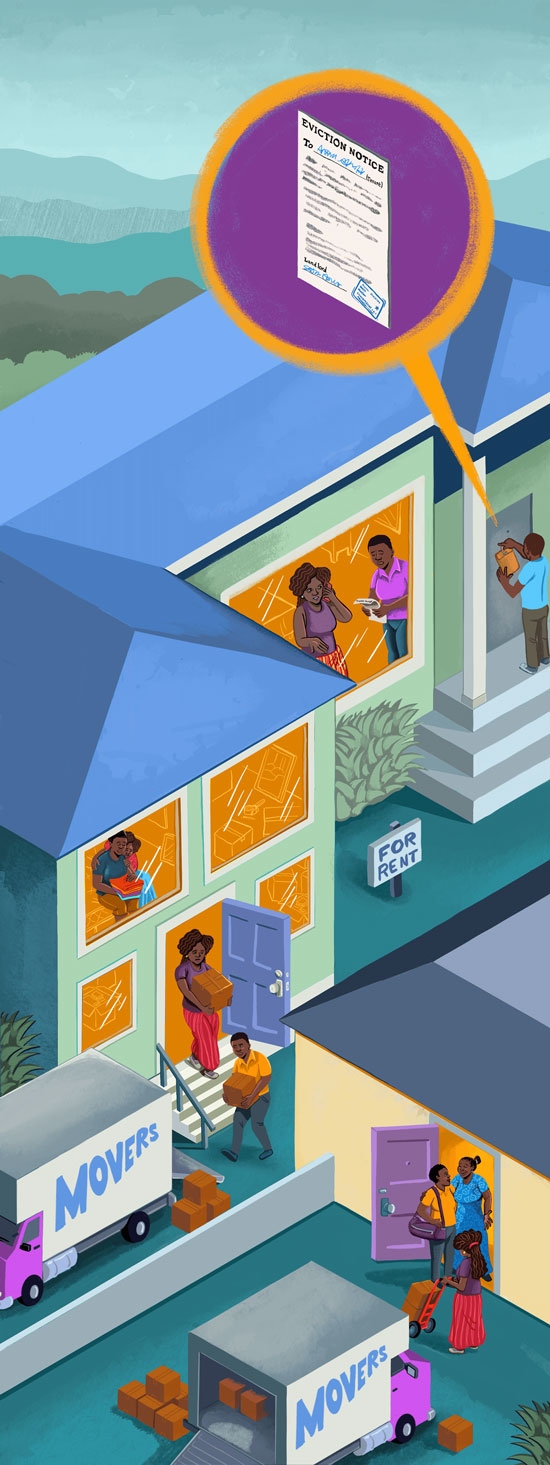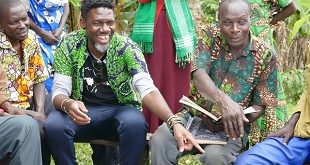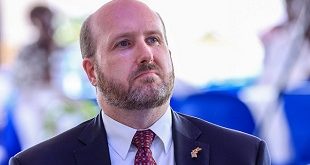
Disowned by their families, evicted by their landlords, and persecuted by the state, LGBTQ Ugandans have fewer and fewer places to turn
Kampala, Uganda | Nakisanze Segawa & Beatrice Lamwaka – Global Press Journal Uganda | Just two days after the Ugandan Parliament passed the Anti-Homosexuality Act in March, Sam, a lesbian, who prefers to be identified by one name for fear of stigmatization, received a call. Her landlord asked her to leave the house she had been renting for almost two years in Kyebando-Kanyanya village, about 4 miles from Kampala.
When Sam asked why she was being evicted, her landlord asked to meet her the following day in the presence of the local chairman (a village leader). She declined, asking for a one-on-one meeting. At the meeting, Sam’s landlord told her that her son, a human rights lawyer, warned her the new law would punish landlords who rent rooms to “homosexuals.”
“‘I don’t want to be arrested on accusations of promoting homosexuality because you are my tenant,’” Sam says the landlord told her.
She (landlord) told her she — and the community — knew she was in a sexual relationship with another woman. By March, Sam’s partner had not been living in the country for months, but with the probability of the president signing the Anti-Homosexuality Act into law, the witch hunt was already on to identify those who should be reported.
Sam didn’t deny or confirm her sexual identity to the landlord but immediately vacated the premises.

President Yoweri Museveni’s recent signing of the Anti-Homosexuality Act into law threatens to make the lives of Uganda’s LGBTQ community members even more difficult, as landlords will face consequences for renting property to them. (LGBTQ refers to those who identify as lesbian, gay, bisexual, transgender or queer.)
According to reports published in April and May 2023 by Human Rights Awareness and Promotion Forum, a local NGO that provides legal aid, there was increased violence, including evictions of LGBTQ persons in Uganda, after Parliament had passed the bill but before the president signed it.
In the three-month period from March 21, when Parliament passed the bill, and May 29, 2023, the last day before the law came into force, HRAPF handled 141 cases involving LGBTQ or suspected LGBTQ persons. This is twice as many incidents than were reported in all of 2021.
Of these cases, 65% involved violence or violations that targeted individuals purely or partly on the basis of their presumed sexuality and gender identity, and affected a total of 159 persons. Twenty-eight of these cases were evictions, affecting 66 persons.
In the 21-day period after the law came into force, from May 30 to June 20, 2023, HRAPF handled a further 43 cases involving LGBTQ persons, of which eight cases were evictions that affected nine individuals. The evictions were mostly carried out by property owners, though local council leaders were also involved in some. The evictions in these three weeks are almost three times as many as were reported in all of 2021 and only slightly higher than those recorded in the second half of 2020.
How Uganda’s Anti-Homosexuality Act affects landlords and tenants
Sam believes the bill has ruined the relationship between landlords — many of whom were previously tolerant of members of the LGBTQ community — and tenants.
A statement issued by Anita Among, speaker of Uganda’s Parliament, after the presidential signing of the bill reads, “I now encourage the duty bearers under the law to execute the mandate bestowed upon them in the Anti-Homosexuality Act. The people of Uganda have spoken, and it is your duty to now enforce the law in a fair, steadfast, and firm manner.”
The law is explicit on the risks to those thought to be housing members of the community. The main section dealing with tenancy is titled “Brothels,” but it could easily be construed as anyone renting property to someone from the community. Clause b of section 12 reads, “A person being the owner or occupier of premises or having or acting or assisting in the management or control of the premises, induces or knowingly causes any man or woman to resort to or be upon such premises for the purpose of being unlawfully and carnally known by any man or woman of the same sex whether such carnal knowledge is intended to be with any particular man or woman, commits an offence and is liable, on conviction, to imprisonment for one year.”
But according to the member of Parliament for the Bubulo East constituency, John Musila, “Those claiming to be evicted are artificial homosexuals promoting homosexuality for monetary gains. No landlord will come to look through your door to see who you are sleeping with. Then how can they be punished for housing people they have not caught in the act of sex?”
The lawmaker, who voted for the Anti-Homosexuality Act, adds, “The law is very clear. It doesn’t discriminate or punish someone for being gay or a lesbian because we know that in our African communities, we have always had these people.” Speaking about a 75-year-old bisexual woman in his village, whom the community knows about and who has never been attacked, he says, “The law only punishes those who are caught in the homosexual act: a man having sex with a man, an individual raping a minor, a woman having sex with a woman. It also punishes those who promote it and those who rape children.”
Musila also says that the HRAPF reports on evictions and violence against the community are a ploy to get donor funding and “not an actual reflection of events where homosexuals were caught having sex, therefore breaking the law.”
Musila’s statements reflect the confusing language of the Anti-Homosexuality Act, which lists one of its primary principles as “prohibiting any form of sexual relations between persons of the same sex and the promotion or recognition of sexual relations between persons of the same sex.”
Those being evicted could be suffering an unintended consequence of the law. According to Eron Kiiza, a human rights lawyer, landlords are required by the law to terminate the tenancy of those they discover ‘engaged in homosexuality.’ Not knowing that their tenant is a member of the LGBTQ community is a legal defense, but one that is difficult for landlords to prove. If members of the community are found living in a certain premise, the landlord could still be subjected to criminal proceedings which are traumatizing and can lead to stigmatization of the landlord even if they eventually get acquitted. Kiiza also adds that prior to the law, there were already landlords who were hostile to the community due to religious or cultural reasons. The new law not only empowers them to evict LGBTQ individuals but also obligates them to do so as soon as they discover their sexuality.
Global Press reached out to both Ofwono Opondo, the government spokesperson, and Norbert Mao, the Minister of Justice and Constitutional Affairs, but have not yet been able to get a statement from either.
Evictions of LGBTQ community members in Uganda and rising homophobia
Sandra Ntebi, who identifies as a trans man, says that in his community, no one was bothered by his sexuality until the bill came about.
Ntebi says, “Everyone knew me as ‘omusiyazi,’” a Luganda word that loosely translates to “being gay.”
“I could move to Mulungu fish market freely with my wife, where we run a bar and also have friends, including many of our LGBTQ friends. We would have drinks and eat fish in the market, and no one cared about us until the [Anti-Homosexuality Act] came,” he says.
Ntebi, also referred to as Uncle Sandra at the market, believes he was evicted from the bar because of his sexuality, even though a disagreement between him and his landlord over other matters may have contributed.
Ramathan Kaggwa, who identifies as gay, is among those who have been evicted, though in his case, the methods to get him to move were more subtle. He lived in a home in Gayaza, Wakiso district, 13 miles from Kampala, with 14 other members of the LGBTQ community.
Kaggwa, who is a pastor, says when the bill was passed, posters of his church and his face started circulating on social media, accusing his church of promoting and recruiting young people into homosexuality.
“Then my landlord forwarded one of the posters to me via WhatsApp and a text asking if it was true what the poster claimed,” Kaggwa says. He denied the claims, but the damage was already done.
The next day, water was cut off. Kaggwa complained to his landlord for six days — to no avail. Unable to use the toilets, bathrooms or kitchen, amid rising accusations from the local community that the shelter was “full of homosexuals,” Kaggwa and his housemates chose to vacate the premises, fearing for their safety.
Eric Ndawula, the executive director of the Lifeline Youth Empowerment Center, was given 10 days to vacate a house he rented because a video circulated where he was talking about his sexual orientation as a gay man. He says he now considers himself an internally displaced person. “Staying at home is your best security given the situation now,” he says.
Pius Kennedy Kigundu, a youth pastor and an office administrator at the Africa Queer Network, says his landlord gave him seven days to vacate his premises soon after the president signed the bill. He had been living with his partner for two years and says that previously no one was concerned about his sexual orientation, “but they are now suspecting that I am gay.”
“The landlord promised to seek legal proceedings in case I fail to vacate the premises in the designated time. That is one week from the date of eviction,” Kigundu says.
Stephen Kabuye, the executive director of Coloured Voice Uganda says, “I am deeply concerned about the consequences of Uganda’s Anti-Homosexuality Act 2023. This law violates basic human rights and sets a dangerous precedent for discrimination and persecution against the LGBTQ+ community.”
Kabuye’s landlord evicted him in March, and he has now settled in a rural place far from Kampala. Kabuye feels safer here than in the city, where he believes people have been influenced by misinformation about the LGBTQ community. His landlord told him he doesn’t want to go to prison because of him, so he was left with no alternative but to leave. Kabuye believes there will be rampant evictions since landlords have been empowered by the law.
Justine Balya, acting director of the Access to Justice Programme at the Human Rights Awareness and Promotion Forum, says, “Homophobia is an easy excuse to accept because the discussion in Parliament, in the streets, and from religious leaders is playing with people’s fears. They are telling people that every queer person you see is a potential rapist and is looking at your children. ‘Run away from them!’” This is why landlords feel obliged to evict their tenants. With the harsh penalties in the law for those thought to be aiding the community, evictions can be expected to continue — even from those who in the past would have turned a blind eye.
Shelters and cohabiting in Uganda’s LGBTQ community
For many in the community, these waves of evictions are particularly painful, as many have already been kicked out and disinherited by their own families.
John Grace, coordinator at the Uganda Minority Shelters Consortium, a local NGO that provides safe housing for LGBTQ persons, says their applications for assistance have doubled as a result of evictions and they are unable to admit all of them. “Even people who didn’t know about the shelters now know where to find help,” he says.
Grace says evictions didn’t start with the bill — there were already raids on LGBTQ shelters — but the law has worsened the situation. The last widely reported raids on LGBTQ shelters were in 2019, but Grace believes that many others go unreported as those who run the shelters fear being accused of promoting homosexuality.
“The bill has now empowered society to respond on their own,” he says.
Grace’s path into assisting members of the community to find safe housing was inspired by his own story. When his father discovered he was gay, he officially communicated to relatives that John Grace was no longer a part of the family. He was taken off WhatsApp groups and told he could only return home once he was a straight man. “Now, I can only rely on non-blood relations,” he says.
Grace says there are currently 25 LGBTQ shelters in Uganda with 150 people on average housed in all the shelters at any given time, as they are designed to be transitional. They are segregated by location and categories of occupants. But the transition rates are slow because many residents have lost jobs and been rejected by families. With nowhere else to go, they remain in overcrowded shelters. The numbers are higher when taking into account informal shelters. Most of those interviewed for this story lived in shared premises with other members of the community.
Double stigma and risk of losing their newfound homes
After eviction in February this year, Aggie Dennett Harmon, a pastor and executive director of Talented Youth Community Fellowship Uganda, a nonprofit that nurtures talented transgender youth, had to find a new place to live. She left out some information about the group and said they are a group of youth looking to rent somewhere — but did not mention they are all transgender. The group of about 50 lives in a gated home and hardly allows in any guests, but once inside they live their lives normally.
“It’s like another lockdown,” Harmon says, in reference to restrictions during the COVID-19 pandemic.
Mother Stephanie is the foster mother of three queer children whom she was separated from after she lost her job in a supermarket and was later evicted. She is a trans woman who found haven in the same shelter as Harmon, but she says it is now like a prison. “We worry about getting out of the gate and people recognizing us,” she says. “If we need something, we only go out at night. We can’t enjoy our rights like other people.”
Mother Stephanie’s “foster” children are over the age of 18 and belong to the LGBTQ community. She fosters them to teach them “how to survive in this hostile environment.” Most of them have also been rejected by their birth families.
“The shelter has taken away the worries of rent, what to eat, as I have no job, but there is constant fear that we will be raided and forced to do unbelievable examinations in my private parts,” she says. “When I go out at night, I change my dressing and take off the wigs.”
According to Grace, such fears are legitimate. There is evidence of police forcefully conducting physical examinations of those suspected to be part of the LGBTQ community.
For many affected, the evictions are multilayered. Their families have already disowned them, like Grace. Some have been kicked out of academic institutions or lost jobs because of their presumed sexual orientation. Then, they find themselves in shelters, the shelters get raided, and they are treated inhumanely by the police who are meant to protect them.
“Sustaining legal aid and emergency, safety and security interventions to respond to cases as they come in — putting out fire as they come is the only way forward at the moment,” Balya says.
In the beginning, Mother Stephanie found some freedom in the shelter.
“The shelter acts as a healing center,” she says, “a free space where one lives to surely express themselves in terms of gender, freedom.”
But the bill has now turned it into a place of fear.
“I don’t intend to stay at the shelter any longer because the signing of the bill has caused us more harm, unrest and more fear, whereby we can no longer hide in shelters anymore because we are now more hunted than before.”
******
This story was originally published by Global Press Journal (link).
*****
✳ Global Press Journal is an award-winning international non-profit news publication that employs local women reporters in more than 40 independent news bureaus across Africa, Asia and Latin America.
*****
Nakisanze Segawa, GPJ, translated some interviews from Luganda.
 The Independent Uganda: You get the Truth we Pay the Price
The Independent Uganda: You get the Truth we Pay the Price


This Satanic deviant behavior is Antihuman, Antifamily and Abnormal, and is NOT a Human Right.Periodt. Given the slightest tolerance, it will quickly overwhelm Humanity like the Cancer that it is. You Can’t Normalize Abnormality